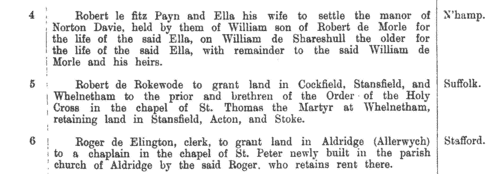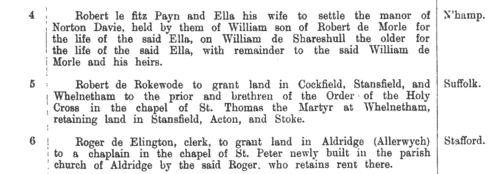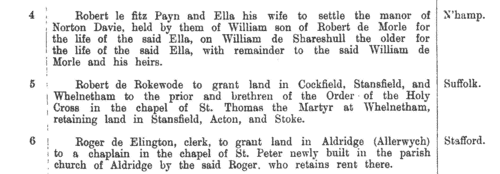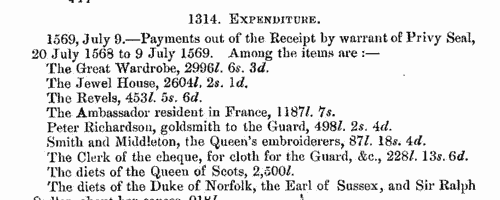Basyng Surname Ancestry ResultsOur indexes 1000-1999 include entries for the spelling 'basyng'. In the period you have requested, we have the following 18 records (displaying 11 to 18): Buy all | | | Get all 18 records to view, to save and print for £80.00 |
These sample scans are from the original record. You will get scans of the full pages or articles where the surname you searched for has been found. Your web browser may prevent the sample windows from opening; in this case please change your browser settings to allow pop-up windows from this site. Landowners and tenants in Buckinghamshire
(1345-1485)
Inquisitions ad quod damnum were held by the appropriate sheriff or escheator (or other officer in whose bailiwick the matter in question might lie) to investigate cases in which the royal or public interest might be damaged by proposed alienation or settlement of land (especially alienation to religious uses, into mortmain). The key findings from these inquisitions were as to the tenure of the land and the service due from it; its yearly value; the lands remaining to the grantor, and whether they sufficed to discharge all duties and customs due from him; and whether he can still be put upon juries, assizes and recognitions, so that the country be not burdened by his withdrawal from them. Generally speaking, this process had the makings of a system of licensing such alienations, and raising money in proportion to the valuations. Equally, there are many items that deal with subjects such as the closing of public roads, the felling or inclosing of woods, or the proposed grant of liberties or immunities. A calendar of these inquisitions from the 19th year of the reign of king Edward III to the 2nd year of Richard III was prepared by the Public Record Office and published in 1906. We have now indexed this calendar by surname and county. Most of the individuals appearing in the calendar are either pious individuals seeking to make grants to religious bodies for the sake of their souls; or landowners securing the disposition and settling of their real estate. But some other names do appear - tenants, trustees, chaplains and clerks.BASYNG. Cost: £6.00.  | Sample scan, click to enlarge

| Landowners and tenants in Hertfordshire
(1345-1485)
Inquisitions ad quod damnum were held by the appropriate sheriff or escheator (or other officer in whose bailiwick the matter in question might lie) to investigate cases in which the royal or public interest might be damaged by proposed alienation or settlement of land (especially alienation to religious uses, into mortmain). The key findings from these inquisitions were as to the tenure of the land and the service due from it; its yearly value; the lands remaining to the grantor, and whether they sufficed to discharge all duties and customs due from him; and whether he can still be put upon juries, assizes and recognitions, so that the country be not burdened by his withdrawal from them. Generally speaking, this process had the makings of a system of licensing such alienations, and raising money in proportion to the valuations. Equally, there are many items that deal with subjects such as the closing of public roads, the felling or inclosing of woods, or the proposed grant of liberties or immunities. A calendar of these inquisitions from the 19th year of the reign of king Edward III to the 2nd year of Richard III was prepared by the Public Record Office and published in 1906. We have now indexed this calendar by surname and county. Most of the individuals appearing in the calendar are either pious individuals seeking to make grants to religious bodies for the sake of their souls; or landowners securing the disposition and settling of their real estate. But some other names do appear - tenants, trustees, chaplains and clerks.BASYNG. Cost: £6.00.  | Sample scan, click to enlarge

| Landowners and tenants in Northamptonshire
(1345-1485)
Inquisitions ad quod damnum were held by the appropriate sheriff or escheator (or other officer in whose bailiwick the matter in question might lie) to investigate cases in which the royal or public interest might be damaged by proposed alienation or settlement of land (especially alienation to religious uses, into mortmain). The key findings from these inquisitions were as to the tenure of the land and the service due from it; its yearly value; the lands remaining to the grantor, and whether they sufficed to discharge all duties and customs due from him; and whether he can still be put upon juries, assizes and recognitions, so that the country be not burdened by his withdrawal from them. Generally speaking, this process had the makings of a system of licensing such alienations, and raising money in proportion to the valuations. Equally, there are many items that deal with subjects such as the closing of public roads, the felling or inclosing of woods, or the proposed grant of liberties or immunities. A calendar of these inquisitions from the 19th year of the reign of king Edward III to the 2nd year of Richard III was prepared by the Public Record Office and published in 1906. We have now indexed this calendar by surname and county. Most of the individuals appearing in the calendar are either pious individuals seeking to make grants to religious bodies for the sake of their souls; or landowners securing the disposition and settling of their real estate. But some other names do appear - tenants, trustees, chaplains and clerks.BASYNG. Cost: £6.00.  | Sample scan, click to enlarge

| London Liverymen: Merchant Taylors
(1537)
J. Caley, F.R.S., F.S.A. transcribed this 'curious record' found in the Chapter House, Westminster, 'a list of the freemen of the various companies resident in London and Westminster; from Thomas Lewyn being mentioned as sheriff, it appears it was made in the year 1537.' Thirty-seven companies are listed, comprising 2400 individuals: Armourers, Bakers, Barber Surgeons, Blacksmiths, Brewers, Broiderers, Clothworkers, Coopers, Cordwainers, Curriers, Cutlers, Drapers, Fishmongers, Fletchers, Founders, Freemasons, Fruiterers, Goldsmiths, Grocers, Haberdashers, Innholders, Ironmongers, Joiners, Leather Sellers, Merchant Taylors, Painter Stainers, Plasterers, Plumbers, Saddlers, Salters, Skinners, Spurriers, Tallow Chandlers, Tilers, Vintners, Wax Chandlers and Weavers. BASYNG. Cost: £6.00.  | Sample scan, click to enlarge

| Cecil Manuscripts
(1540-1571)
Letters and papers of the Earl of Hertford and (1551-1571) sir William Cecil, Secretary of State. Also includes some miscellaneous material as early as 1306.BASYNG. Cost: £4.00.  | Sample scan, click to enlarge

| Penshurst Manuscripts
(1150-1580)
C. L. Kingsford prepared a calendar of the papers of Lord de L'Isle and Dudley at Penshurst Place in Kent for the Historical Manuscripts Commission, of which this first volume was published in 1925. The material is presented in eleven sections: I. 39 deeds relating to the Sydney family's Surrey and Sussex estates from about 1150 to 1502; II. Summary notes on deeds from these and other English counties (mainly Essex, Kent, Lincolnshire and Yorkshire) and from Wales and Ireland; III. Documents relating to Robertsbridge Abbey in Sussex (charters and deeds; rentals; court rolls; reeve's accounts at Footland; and bursar's accounts) from 1160 onwards; IV. Deeds and documents relating to the church and college of Tattershall in Lincolnshire (deeds; statutes and ordinances; miscellaneous papers; court rolls; and accounts (warden's, steward's, precentor's and impositor's, receiver's, bailiffs', and building and post-dissolution accounts); V. Family papers and estates accounts of the Cromwells of Tattershall (general accounts and wills; accounts of stewards of the household; building accounts of Tattershall castle; estate accounts); VI. Summary lists of various rolls, rentals, surveys and accounts, from various counties (mainly Kent and Lincolnshire); VII. Documents relating to Penshurst and its owners; VIII. Sydney family papers; IX. Accounts of the ironworks at Robertsbridge and in Glamorgan; X. Papers relating to the Council of Wales, 1526 to 1580; and XI. Irish Accounts, from sir Henry Sydney's terms as Vice-Treasurer and Lord Deputy of Ireland, 1556 to 1578.BASYNG. Cost: £4.00.  | Sample scan, click to enlarge

| Official Papers
(1547-1580)
The State Papers Domestic cover all manner of business relating to England, Ireland and the colonies, conducted in the office of the Secretary of State as well as other miscellaneous records.
BASYNG. Cost: £4.00.  | Sample scan, click to enlarge

| Testators and legatees in London
(1358-1688)
The Court of Husting of the city of London sat (usually on a Monday) each week: among its functions was the enrolment of deeds and wills relating to citizens of London. In their strictest technical sense the terms 'will' and 'devise' are appropriate to real estate, and the terms 'testament', 'bequest' and 'legacy' to personal estate, but this distinction is lost sight of in ordinary usage. This calendar of wills proved and enrolled in the Court of Husting was edited by Reginald R. Sharpe, records clerk in the office of the Town Clerk of the City of London, and printed by order of the corporation in 1890. The date of the court is given in italics, with the year in bold in the margin. The testator's name is given in capitals (surname first, in bold), and then a brief listing of substantial bequests, with the names of legatees, and then the date of making of the will, and reference. The bulk of the wills in this volume are from before 1600. BASYNG. Cost: £4.00.  | Sample scan, click to enlarge

|
 | 1 | 2 |
Research your ancestry, family history, genealogy and one-name study by direct access to original records and archives indexed by surname.
|










